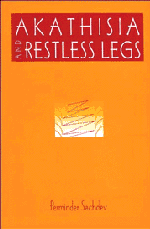Book contents
- Frontmatter
- Contents
- Foreword
- Acknowledgements
- Abbreviations
- Part I Introduction
- Part II Drug-induced akathisia
- Part III Restless legs syndrome
- Part IV Conclusions
- Appendix A Haskovec's Akathisie
- Appendix B Prince Henry Hospital Akathisia Scale
- Appendix C Barnes (1989) Akathisia Rating Scale
- Appendix D Hillside Akathisia Scale (version 4)
- References
- Index
Foreword
Published online by Cambridge University Press: 12 September 2009
- Frontmatter
- Contents
- Foreword
- Acknowledgements
- Abbreviations
- Part I Introduction
- Part II Drug-induced akathisia
- Part III Restless legs syndrome
- Part IV Conclusions
- Appendix A Haskovec's Akathisie
- Appendix B Prince Henry Hospital Akathisia Scale
- Appendix C Barnes (1989) Akathisia Rating Scale
- Appendix D Hillside Akathisia Scale (version 4)
- References
- Index
Summary
In this era of rapidly proliferating scientific articles and texts, it is often difficult to identify and assimilate those publications which are truly useful additions to our knowledge base. Perminder Sachdev's scholarly and thorough review of akathisia and restless legs provides an extremely valuable synopsis of current information on this syndrome, and in fact represents a ‘coming of age’ of akathisia.
Akathisia has come to be associated with neuroleptic drug treatment; however, restless legs syndrome (also referred to as Ekbom's syndrome) as well as the akathisia seen in both postencephalitic and idiopathic parkinsonism may have some important common symptoms and pathophysiological features. Therefore, it is very helpful to have all of these syndromes discussed in one text. This volume thoroughly reviews the concept of restlessness, as well as its manifestations in a variety of clinical and nonclinical contexts. It also includes a compendium of instruments and techniques for assessing akathisia and restlessness.
A detailed discussion of the definition, assessment and diagnosis of drug-induced akathisia is provided and operational criteria for use in clinical research are proposed. Although neuroleptic-induced akathisia can produce a considerable degree of subjective dysphoria, the latter may apparently also occur independently of akathisia and is generally referred to as neuroleptic-induced dysphoria. Despite the paucity of data, the author reviews current knowledge and potential research implications of such dysphoria.
- Type
- Chapter
- Information
- Akathisia and Restless Legs , pp. ix - xPublisher: Cambridge University PressPrint publication year: 1995



